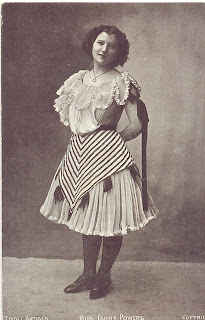I wrote this some time ago and found a copy today.
Between 1890 and the early 20th Century, the employment of children on the stage was controversial. Regulations regarding employment gradually became stricter as the idea of childhood was developed and the importance of education increased.
Famous Child Performers
Many great Australian performers began their stage careers as children. Carrie Moore began as a 13 year old in pantomime, the Beatty sisters began with Pollard's Lilliputians and William Percy also started his long comedic career with that company. Child acts were also popular in vaudeville theatres, Fanny Powers was a huge hit with Tivoli patrons as a 7 year old.
Child stars played small but important roles in plays in pantomimes, however, the rights of the child as a worker were often ignored.
This changed as the 20th Century progressed and adult advocates began to question the use of children in theatrical entertainment.
Child Labour Laws.
However, by 1890, the law had tightened in many states. In Victoria, the law prohibited any child under the age of 10 working after 7 O Clock in winter and 9 O Clock in winter. This limited the use of children in theatrical entertainment. Two prominent entrepreneurs, J C Williamson and Alfred Dampier were fined for breaking this law.
Arguments about child labour.
The fines levied against the managers led to arguments abotu the practice of employing children in theatres. Proponents argued that theatre training improved diction, provided enjoyment and also provided more discipline that many children received at home.
Opponents, including the representatives of the Society for Prevention of Cruelty for Children argued that the theatre exposed children to undesirable elements of society and exploited their precociousness for the benefit of greedy managers.
The Pollard Scandal
The laws regarding child employment continued to develop after Federation and in line with community perceptions of childhood and education. In 1910 an event occurred which focussed the spotlight back onto the theatrical community.
A scandal erupted when a troupe of children, touring under the Pollard name, were stranded in India. The newspapers exploded with accusations of child abuse, the intervention of the Indian authorities in the matter was embarrassing and the difficulty in returning the children to their parents and the subsequent pitiful scenes of reunion, brought the matter of child employment in the theatres to the headlines.
More on the Lilliputian Scandal
Child Labour Legislation by 1911.
By 1911 the government of NSW had legislated to disallow any child under the age of 14 being employed on the stage. The premier of Victoria agreed in principle with this idea, stating that all children of that age should be in school.
Education was seen as more important as the century progressed and subsequent legislation gradually increased the school leaving age to reflect this.
The changing view of childhood and the increasing importance of education to a new society led to the development of harsher strictures for theatrical managers, but did not finish the exploitation of children on stage and screen. However it limited the opportunities for conniving managers and complemented the changing social attitude of the time.











